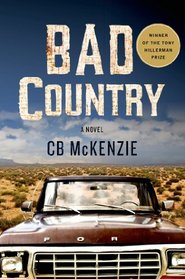Helpful Score: 1
Bad Country gives readers a real feel for how life is lived in the forgotten places of the desert far away from cities. Rodeo lives so far out that the area is called El Hoyo-- The Hole. Out here, it's important that you have friends you can trust and rely on. At first it seems as though where his friends are concerned, Rodeo is all take and no give, but the further into the story you go, you understand why these few are Rodeo's friends.
This book doesn't follow the rules-- just like Rodeo. There are no quotation marks, and a lot of this book is dialogue. There are no chapter headings. Instead there are breaks between scenes. Some Spanish is spoken, and it's not always translated. You know what? It doesn't matter one little bit. I had absolutely no problem knowing which character was speaking, and the breaks between scenes instead of formal chapter headings made perfect sense. As for the Spanish, what words I didn't immediately recognize were easily decipherable just by reading the next line or two.
There's a popular rule in writing: Show. Don't tell. I've seen few writers follow that rule as closely as C.B. McKenzie. None of Rodeo's friends are going to tell you a thing about him. It's up to you to form your own opinion as Rodeo goes out into the desert around his property to leave water for the illegal immigrants traveling through this inhospitable land. It's up to you to see how he treats his old dog. It's up to you to watch him become more concerned about the death of a young boy than anyone in the boy's own family. As Rodeo investigates, he never takes the word of someone else about anything-- he goes to that person, speaks with him, observes his behavior, and forms his own opinion.
This adherence to "Show. Don't tell." is like a breath of fresh air. It provides a depth of clarity and characterization that is difficult to describe but a joy to experience. All I know is that I was sucked into this story, and I didn't want it to end. I want more Rodeo Grace Garnet.
This book doesn't follow the rules-- just like Rodeo. There are no quotation marks, and a lot of this book is dialogue. There are no chapter headings. Instead there are breaks between scenes. Some Spanish is spoken, and it's not always translated. You know what? It doesn't matter one little bit. I had absolutely no problem knowing which character was speaking, and the breaks between scenes instead of formal chapter headings made perfect sense. As for the Spanish, what words I didn't immediately recognize were easily decipherable just by reading the next line or two.
There's a popular rule in writing: Show. Don't tell. I've seen few writers follow that rule as closely as C.B. McKenzie. None of Rodeo's friends are going to tell you a thing about him. It's up to you to form your own opinion as Rodeo goes out into the desert around his property to leave water for the illegal immigrants traveling through this inhospitable land. It's up to you to see how he treats his old dog. It's up to you to watch him become more concerned about the death of a young boy than anyone in the boy's own family. As Rodeo investigates, he never takes the word of someone else about anything-- he goes to that person, speaks with him, observes his behavior, and forms his own opinion.
This adherence to "Show. Don't tell." is like a breath of fresh air. It provides a depth of clarity and characterization that is difficult to describe but a joy to experience. All I know is that I was sucked into this story, and I didn't want it to end. I want more Rodeo Grace Garnet.




![header=[] body=[Get a free book credit right now by joining the club and listing 5 books you have and are willing to share with other members!] Help icon](/images/question.gif?v=29befa08)
